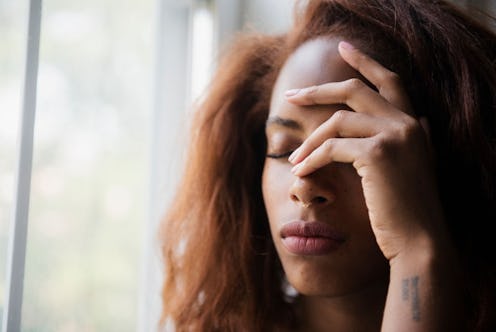Life
This Is Why One Xmas Drink Too Many Might Leave You Feeling Depressed

So last night's holiday party was a big one, and you're feeling something pretty far from wonderful this morning. Alongside the headache, nausea, and desperate craving for a very greasy foodstuff, you might also be experiencing an unusually low mood — even if your night out was fantastic. Does a hangover make you feel depressed? The alcohol, it turns out, might very well be to blame.
To clarify, there's two different issues at play here: there's the feeling of low mood you might experience during a hangover, and then there's clinical depression, which might be exacerbated by drinking. The former is a temporary condition that's likely to dissipate once your hangover lifts, while the latter is a mental illness that requires proper medical attention.
Let's start with the first issue. It's pretty well documented that hangovers can create feelings of guilt, anxiety, and regret, so much so that there's a catchy term for it: hangxiety. But a hangover can also result in low mood — after all, alcohol is a depressant, as Psychology Today explains. What's more, drinking alters your brain chemistry, according to the charity Drinkaware. While the first drink might lower your inhibtions and boost your confidence, after a certain point "negative emotions" like depression, anger, and anxiety take over.
Then there's the fact that you probably didn't get a great night's sleep after falling into bed drunk, even if you were close to completely passing out or slept five hours past your alarm. As WebMD explains, alcohol might make it easier for you to fall asleep, and you might initially experience deeper sleep than usual. But you'll experience less rapid eye movement (REM) sleep, the restorative period in which you might dream.
Dr. Irshaad Ebrahim, medical director at the London Sleep Centre, told WebMD, "Alcohol may seem to be helping you to sleep, as it helps induce sleep, but overall it is more disruptive to sleep, particularly in the second half of the night." He added, "Alcohol also suppresses breathing and can precipitate sleep apnea."
And sleep has a pretty significant impact on mood. According to Harvard's Get Sleep project, a poor night's sleep can leave you "more irritable, short-tempered, and vulnerable to stress," while sleep issues can increase the risk of developing depression (although insomnia is also considered a symptom of depression, as well as a potential cause). It makes sense, then, that if last night's drinks compromised your sleep, that could in turn compromise your mood.
How about if you've already been diagnosed with depression: should you be drinking? First and foremost, that's a question for your doctor. The answer could also depend on whether you're taking medication like SSRIs: the NHS advises you don't drink while you're on them, as alcohol can worsen their side effects. What's more, according to the charity Mental Health Foundation, regular drinking depletes the body's levels of serotonin, a neurotransmitter that's believed to regulate mood. That can worsen your depression, and also create a cycle of dependency: drinking makes you feel low, so you drink more to temporarily relieve the depression, which makes you feel even worse.
Some people begin drinking in an effort to relieve their pre-existing depression, Drinkaware explains, while others might find their depression triggered by their alcohol dependence. Either way, each factor can compound the other, making the cycle a difficult one to break.
So that's your low mood after a big night out demystified: it's probably down to the hangover. But if you're concerned about how much you're drinking, or unsure whether you should be drinking after a depression diagnosis? Consult a doctor or other mental health professional for advice.